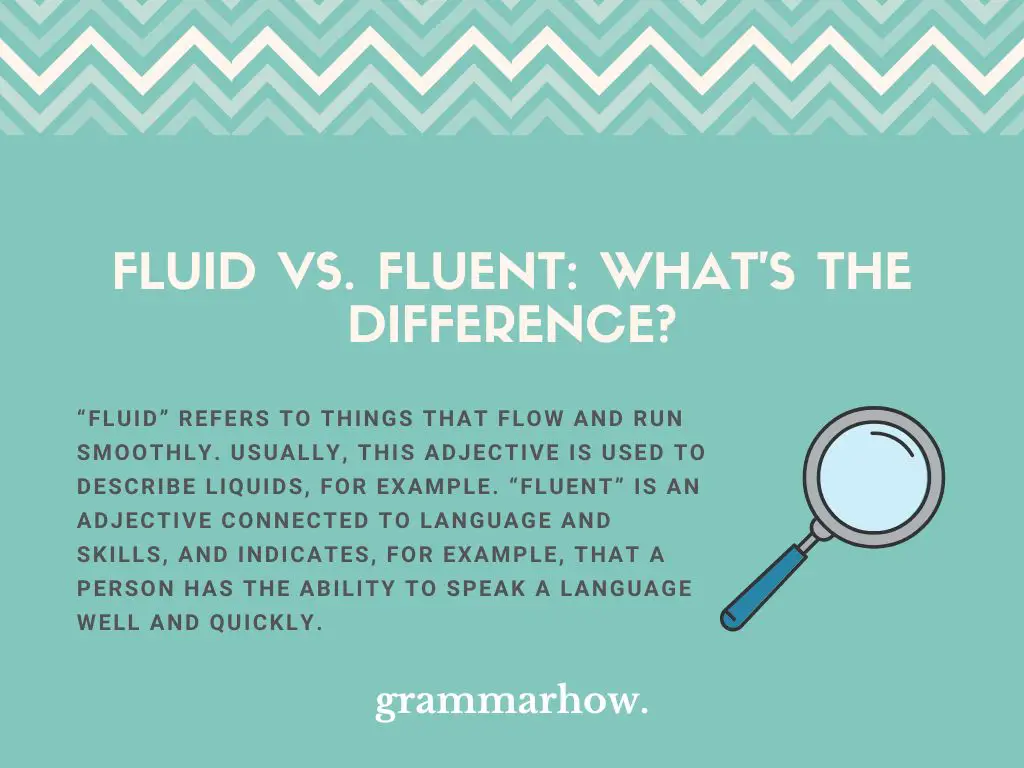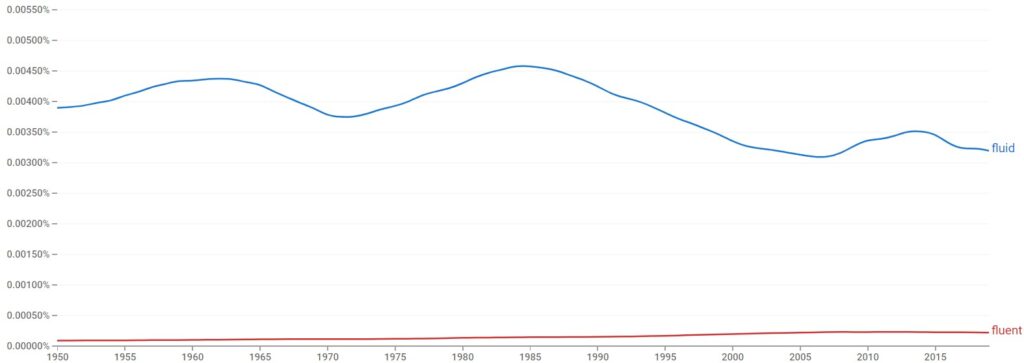When words seem to look the same, it’s important to check if they carry the same meaning. Often, they don’t.
This is the challenge we have right now: let’s look closely at “Fluid” and “Fluent” and understand the difference between them. We’ll also see examples of how to use them.
Fluid vs. Fluent: What’s the Difference?
“Fluid” refers to things that flow and run smoothly. Usually, this adjective is used to describe liquids, for example. “Fluent” is an adjective connected to language and skills, and indicates, for example, that a person has the ability to speak a language well and quickly.

Take a look at some examples.
- Frank spoke Spanish fluently.
- John’s French was more fluent than his Spanish.
- There’s a fluid leak in your car.
- The military situation remains very fluid.
In the first set of sentences, “Fluent” is used to describe someone’s ability to communicate in a particular language. This is the most common, and very specific, use for the word “Fluent”
In the second, “Fluid” specifically relates to the flow of things: on one example, the leak in the car; in the second, on the fact that there was a fluid situation, that changed constantly.
Fluid
Something “Fluid” is constantly changing. It can be a liquid, a material or even something about someone’s life, like a situation or a plan. If it flows freely (literally or figuratively), “Fluid” is a word we can use to describe it.
According to The Cambridge Dictionary, “Fluid” refers to what’s smooth and continuous, as well as things that are likely to change constantly. It could relate to a lot of things, including ideas, situations, feelings, etc.
Here are some examples of the use of “Fluid” in a sentence:
- Her music style was incredibly fluid and dynamic.
- We want to take a vacation, but our plans remain very fluid.
- Close to the break up, the couple’s situation was fluid.
- Clare was fluid in her ideas, changing her mind all the time.
- Is this made of a solid or fluid substance?
To be “Fluid” means to move smoothly, constantly changing. The idea behind it is a liquid that changes shape, every time we move it.
Considering this idea is broader in applicability than “Fluent”, it seems more common in daily conversation.
Fluent
“Fluent” is a word used to describe someone who’s not native, but can speak a language very well. They may or may not have an accent, but they don’t stumble and struggle with pronunciation or the construction of sentences, in order to communicate.
The Cambridge Dictionary defines “Fluent” as the ability to speak a language “easily, well and quickly”.
This is how you can use the word “fluent” in a sentence:
- Erica was fluent in French and German.
- Rebecca was trying to become a fluent Portuguese speaker, but was struggling.
- Becoming fluent in a language can be a very long process.
- I speak sarcasm fluently.
- John’s fluency in the guitar is impressive.
Usually, someone is described as “Fluent” when they speak a second (or third) language very well. There are exceptions, but they are always connected with the idea of language and communication.
In sentence 4, we know sarcasm isn’t a language, like English. But we understand, by the affirmation that someone “speaks sarcasm fluently” that they are sarcastic, in nature.
Same thing goes for sentence 5: John plays the guitar, but many people see music as a language, a form of communication. Therefore, to say John has fluency in playing, makes sense and is correct.
Which Is Used the Most?
Which adjective is more common, more used by people: “Fluid” or “Fluent”? Let’s find it out in the graph from Google Ngram Viewer below.

“Fluent” is a word with limited reach: it refers to the ability to speak a language well. It’s very specific, and consequently, it’s expected that this word would appear less than “Fluid” – that refers to anything that flows smoothly, both literally and figuratively.
Final Thoughts
“Fluid” and “Fluent” aren’t difficult to use in daily life, when you know their meanings well. When describing someone’s language skills, go for “Fluent”. For everything that flows, changes in form or shape, and is constantly in transformation, go for “Fluid”.

Martin holds a Master’s degree in Finance and International Business. He has six years of experience in professional communication with clients, executives, and colleagues. Furthermore, he has teaching experience from Aarhus University. Martin has been featured as an expert in communication and teaching on Forbes and Shopify. Read more about Martin here.

